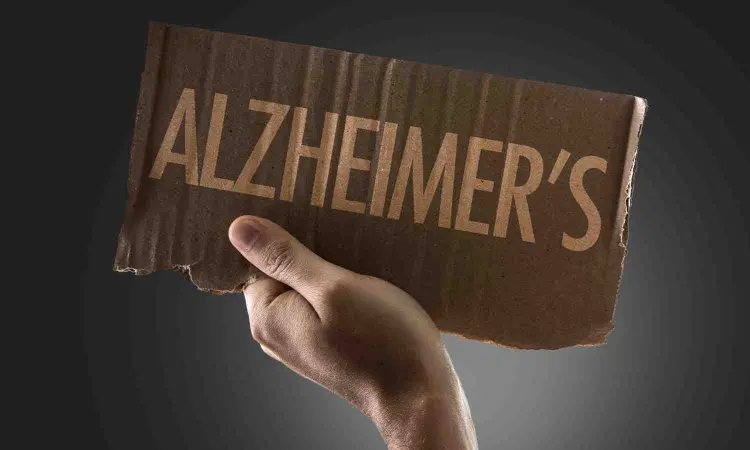- Home
- Medical news & Guidelines
- Anesthesiology
- Cardiology and CTVS
- Critical Care
- Dentistry
- Dermatology
- Diabetes and Endocrinology
- ENT
- Gastroenterology
- Medicine
- Nephrology
- Neurology
- Obstretics-Gynaecology
- Oncology
- Ophthalmology
- Orthopaedics
- Pediatrics-Neonatology
- Psychiatry
- Pulmonology
- Radiology
- Surgery
- Urology
- Laboratory Medicine
- Diet
- Nursing
- Paramedical
- Physiotherapy
- Health news
- Fact Check
- Bone Health Fact Check
- Brain Health Fact Check
- Cancer Related Fact Check
- Child Care Fact Check
- Dental and oral health fact check
- Diabetes and metabolic health fact check
- Diet and Nutrition Fact Check
- Eye and ENT Care Fact Check
- Fitness fact check
- Gut health fact check
- Heart health fact check
- Kidney health fact check
- Medical education fact check
- Men's health fact check
- Respiratory fact check
- Skin and hair care fact check
- Vaccine and Immunization fact check
- Women's health fact check
- AYUSH
- State News
- Andaman and Nicobar Islands
- Andhra Pradesh
- Arunachal Pradesh
- Assam
- Bihar
- Chandigarh
- Chattisgarh
- Dadra and Nagar Haveli
- Daman and Diu
- Delhi
- Goa
- Gujarat
- Haryana
- Himachal Pradesh
- Jammu & Kashmir
- Jharkhand
- Karnataka
- Kerala
- Ladakh
- Lakshadweep
- Madhya Pradesh
- Maharashtra
- Manipur
- Meghalaya
- Mizoram
- Nagaland
- Odisha
- Puducherry
- Punjab
- Rajasthan
- Sikkim
- Tamil Nadu
- Telangana
- Tripura
- Uttar Pradesh
- Uttrakhand
- West Bengal
- Medical Education
- Industry
Heparin therapy may significantly delay diagnosis of Alzheimer's dementia, suggests study

A new study published in the journal of Molecular Psychiatry found that heparin medication was linked to a delayed diagnosis of Alzheimer's dementia. Recent data indicated that the relationship between APOE and heparan sulphate proteoglycans (HSPGs) may have bearing on Alzheimer's disease (AD) susceptibility, defense and possible prevention and therapy. It also has a very low affinity for the rare ApoE Christchurch variant, which was linked to a very low risk of AD dementia in a carrier of Presenilin 1 (PSEN1).
A typical anticoagulant medication is heparin, a hyper-sulfated form of heparan sulphate that is present in mast cells. When unfractionated heparin (UFH), a minimally processed version of naturally produced heparin, was first used in clinical settings in the 1930s, it marked a significant advancement in medicine. In addition to managing coagulation during procedures like cardiac surgery, dialysis, or extracorporeal circulation,
UFH and low molecular weight heparin (LMWH) are commonly used to treat and prevent thrombotic events like atrial fibrillation (AF), deep vein thrombosis (DVT), and pulmonary embolism (PE). Benjamin Readhead and colleagues investigated whether heparin medication was linked to a delayed diagnosis of AD dementia using electronic health records (EHR) from two distinct health systems.
Individuals who received or did not receive heparin therapy had at least 5 years of observation and were at least 65 years old at the time of their last visit with subsequent diagnostic code or drug treatment evidence of possible AD dementia. They were compared using longitudinal EHR data from 15,183 patients from the Mount Sinai Health System (MSHS) and 6207 patients from Columbia University Medical Centre (CUMC) in separate survival analyses. Age, sex, comorbidities, length of follow-up, and number of inpatient stays were all taken into account in the analyses.
Significant delays in the age at which AD dementia was clinically diagnosed were linked to heparin medication. These delays included +1.0 years in the MSMS cohort (P < 0.001) and +1.0 years in the CUMC cohort (P < 0.001). This data supports the possible functions of heparin-like medications and HSPGs in preventing and protecting against AD dementia, even if further research is required. Overall, the results of this study suggest that heparin treatment may have a preventive effect against the eventual onset of AD. These results may help guide the design of next research to look into the link in depth.
Reference:
Readhead, B., Klang, E., Gisladottir, U., Vandromme, M., Li, L., Quiroz, Y. T., Arboleda-Velasquez, J. F., Dudley, J. T., Tatonetti, N. P., Glicksberg, B. S., & Reiman, E. M. (2024). Heparin treatment is associated with a delayed diagnosis of Alzheimer’s dementia in electronic health records from two large United States health systems. In Molecular Psychiatry. Springer Science and Business Media LLC. https://doi.org/10.1038/s41380-024-02757-5
Neuroscience Masters graduate
Jacinthlyn Sylvia, a Neuroscience Master's graduate from Chennai has worked extensively in deciphering the neurobiology of cognition and motor control in aging. She also has spread-out exposure to Neurosurgery from her Bachelor’s. She is currently involved in active Neuro-Oncology research. She is an upcoming neuroscientist with a fiery passion for writing. Her news cover at Medical Dialogues feature recent discoveries and updates from the healthcare and biomedical research fields. She can be reached at editorial@medicaldialogues.in
Dr Kamal Kant Kohli-MBBS, DTCD- a chest specialist with more than 30 years of practice and a flair for writing clinical articles, Dr Kamal Kant Kohli joined Medical Dialogues as a Chief Editor of Medical News. Besides writing articles, as an editor, he proofreads and verifies all the medical content published on Medical Dialogues including those coming from journals, studies,medical conferences,guidelines etc. Email: drkohli@medicaldialogues.in. Contact no. 011-43720751


